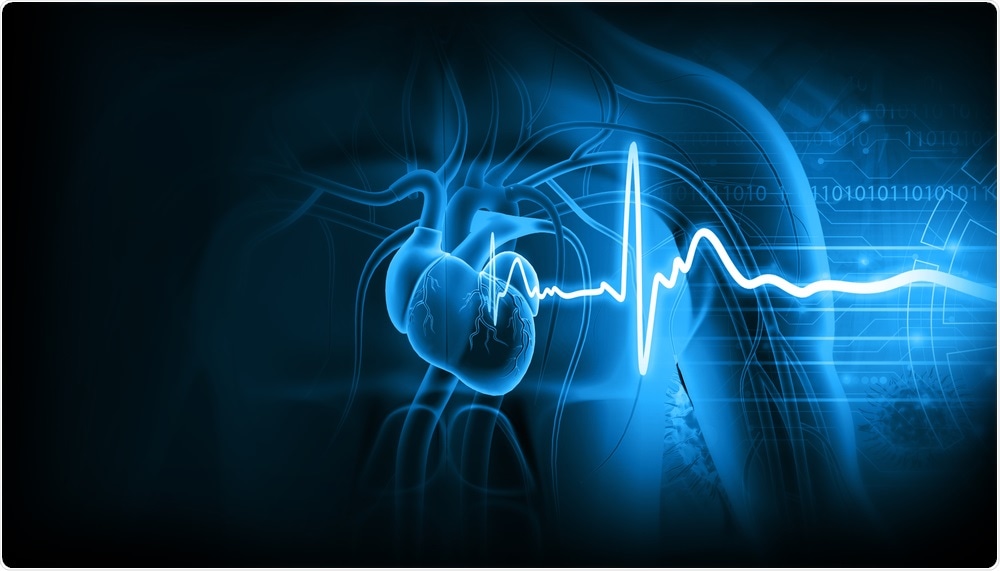A recent study published in Mayo Clinic Proceedings discusses the efficacy of an artificial intelligence (AI)-enhanced electrocardiography (ECG) technique that has been used to diagnose left ventricular dysfunction in coronavirus disease 2019 (COVID-19) patients.

ECG. Image Credit: Explode/Shutterstock.com
Assessing cardiac dysfunction in COVID-19
COVID-19, which is the result of infection by the severe acute respiratory syndrome coronavirus 2 (SARS-CoV-2), commonly causes cardiac injury to develop in hospitalized patients. Acute myocardial injury as a result of COVID-19 can cause a wild range of conditions including asymptomatic elevation of cardiac troponins to fulminant myocarditis and circulatory shock.
Transthoracic echocardiography is the most common diagnostic method that is used to assess left ventricular function. Unfortunately, this method is often labor-intensive, requires an experienced user to perform the test, and causes the healthcare provider to be exposed to the patient for an extended period during the image acquisition process.
AI ECG
Previous studies have demonstrated the development of a novel noninvasive method for assessing cardiac function in patients. This method incorporates AI through the use of a convolutional neural network to a standard 10-second and 12-lead ECG. This novel diagnostic approach was found to successfully identify the presence of left ventricular dysfunction in these previous reports. To this end, left ventricular dysfunction is measured by the area under the receiver operator curve (AUC).
As of May 11, 2020, the United States Food and Drug Administration issued an Emergency Use Authorization for this AI-ECG application in assessing cardiac dysfunction in COVID-19 patients. In a recent report published in Mayo Clinic Proceedings, the researchers discuss how this new approach was successfully incorporated into the treatment of COVID-19 patients in the Mayo Clinic system.
To this end, the AI-ECG approach was used on a total of 27 patients with a median age of 67 who were positive for COVID-19. Of these 27 patients, 3 (11.1%) were found to have depressed ventricular function along with their COVID-19 diagnosis, one of which was presumed to be secondary to COVID-19 myocarditis.
This patient, who was a 77-year-old woman, initially presented with a normal AI-ECG upon admission to the hospital; however, by day 2, this patient exhibited an ejection fraction that was less than or equal to 40% according to the AI analysis. Ultimately, this patient developed progressive dyspnea and succumbed to her illness.
Aside from this patient, AI-ECG was also used for the two other patients with left ventricular dysfunction in this study. AI-ECG accurately diagnosed this cardiac injury before and after one patient’s COVID-19 diagnosis, whereas this method was used to identify left ventricular dysfunction at the time of their COVID-19 diagnosis.
Future applications
In this system, the neural network was trained to identify both subtle and nonspecific patterns in a standard ECG that reflect a wide range of cardiovascular diseases including left ventricular dysfunction, intermittent atrial fibrillation, and hypertrophic cardiomyopathy. An additional advantage of the AI-ECG technology discussed here is that it could also be used with smartphone-enabled electrodes. Furthermore, this novel technology has been shown to perform well among diverse ethnic, age, racial, and sex groups.
Although the number of patients that were included in this study was small, the ejection fraction of 40% accurately represented findings that have been published from much larger studies on cardiac injury in COVID-19 patients. Overall, the diagnoses provided by the AI-ECG technology has a promising future in healthcare, as it appears to be an accurate diagnostic tool that also minimizes the risk of exposure for healthcare providers.
- Attia ZI, Kapa S, Dugan J, Rapid exclusion of COVID infection with the artificial intelligence ECG. Mayo Clinic Proceedings (2021), doi: https://doi.org/10.1016/j.mayocp.2021.05.027.
https://news.google.com/__i/rss/rd/articles/CBMiiAFodHRwczovL3d3dy5uZXdzLW1lZGljYWwubmV0L25ld3MvMjAyMTA2MTcvQUktRUNHLWFzLWEtbm92ZWwtbm9uaW52YXNpdmUtYXBwcm9hY2gtdG8tZGlhZ25vc2luZy1jYXJkaWFjLWluanVyeS1pbi1DT1ZJRC0xOS1wYXRpZW50cy5hc3B40gGMAWh0dHBzOi8vd3d3Lm5ld3MtbWVkaWNhbC5uZXQvYW1wL25ld3MvMjAyMTA2MTcvQUktRUNHLWFzLWEtbm92ZWwtbm9uaW52YXNpdmUtYXBwcm9hY2gtdG8tZGlhZ25vc2luZy1jYXJkaWFjLWluanVyeS1pbi1DT1ZJRC0xOS1wYXRpZW50cy5hc3B4?oc=5
2021-06-17 12:29:00Z
CAIiEKm0HzVpmvNHvU4L71uXeM8qMwgEKioIACIQZdRflS9INK7zM5FkBi3R3CoUCAoiEGXUX5UvSDSu8zORZAYt0dwww8TIBg
Bagikan Berita Ini














0 Response to "AI ECG as a novel noninvasive approach to diagnosing cardiac injury in COVID-19 patients - News-Medical.Net"
Post a Comment